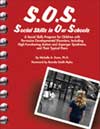
S.O.S. Social Skills in Our Schools: A Social Skills Program for Verbal Children with Pervasive Developmental Disorders and Their Typical Peers.
Author: Michelle A. Dunn, Ph.D.
Publishing Info: November 2005
Reviewed by Maureen Bennie: Director, Autism Awareness Centre Inc.
Individuals on the autism spectrum have social deficits which affect their ability to interact with peers, converse, and make friends. Because our children spend most of their day at school, social skills need to be addressed in the school setting. Michelle Dunn’s new book S.O.S. Social Skills In Our Schools is a social skills curriculum designed for verbal children on the spectrum in grades 1 to 6 and their typical peers.
This is a program the entire school follows. Including typical peers in a social skills program is critical to developing fairness, tolerance and fostering initiation to children with ASD. Inclusion and understanding reduces the risk of bullying and teasing.
Dunn’s model encourages the practice of social skills in a variety of settings to increase the likelihood of generalization of these skills, something these children do not do naturally. There are some questions that need to be asked first to see if a child belongs in a social skills group or needs to be taught individually. Can they follow instructions in a group? Can they wait? Using the questions provided in the book will ensure that a child is ready for the group program.
The S.O.S pull-out lessons are taught in groups of no more than six ASD children of the same language level. The lessons are based on Cognitive Behavioral Therapy and are adult mediated. Five main goals are taught in these lessons: modulation of behavior and emotional responses, learning social rules (body language, prosody of speech), understanding the main idea of a conversation, reduction of perseveration and preoccupations, and developing insight into the impact of their behavior on others, others reactions, and consequences to actions.
Dunn’s model involves the class in social skills education to develop fairness and tolerance amongst classmates. In elementary school, most children will remain together in a class from kindergarten to grade 6. The social skills concepts could be taught under the subjects of health, religion, or social studies. Typical children need guidance in the area social skills. Following this program can improve the classroom atmosphere and increase positive interactions. Five classroom lessons are taught once a week during weeks 2 to 6 of the school year, then 4 booster lessons follow in November, January, March, and May. Each lesson plan outlines the goals and provides the activities.
The pull-out lessons include letters to the parents to explain what was covered in the lesson and the homework assignment. There are many graphic organizers and handouts for the children. There section of the book for the peer mentoring program which includes 5 lessons and a section for parent training. The goals,materials list, activities and letters to the parents for each lesson are well written making this an easy to implement and user friendly curriculum.
It is a pleasure to finally see a social skills program that includes the entire school and staff and has them working as a whole unit. Schools are small communities within a larger social community, therefore social skills and positive peer interactions need to be addressed with all students. The pull-out lessons for the children with ASD build individual skills that set the groundwork for successful social interactions. The classroom lessons teach critical skills for social success that will serve students throughout their lives. Any school that chooses to adopt this program will create a better environment for all students.
Visit our Bookstore to purchase S.O.S. Social Skills in Our Schools: A Social Skills Program for Verbal Children with Pervasive Developmental Disorders and Their Typical Peers.
Editorial Policy: Autism Awareness Centre believes that education is the key to success in assisting individuals who have autism and related disorders. Autism Awareness Centre’s mission is to ensure our extensive autism resource selection features the newest titles available in North America. Note that the information contained on this web site should not be used as a substitute for medical care and advice.
